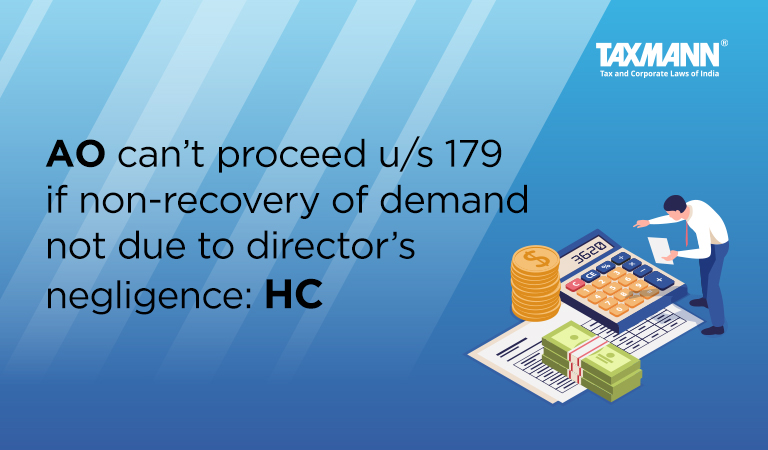AO can’t proceed u/s 179 if non-recovery of demand not due to director’s negligence: HC
- Blog|News|Income Tax|
- 2 Min Read
- By Taxmann
- |
- Last Updated on 27 December, 2022

Case Details: Devendra Babulal Jain v. ITO - [2022] 145 taxmann.com 553 (Gujarat)
Judiciary and Counsel Details
-
- N.V. Anjaria & Bhargav D. Karia, JJ.
- Jaimin R. Dave for the Petitioner.
- Nikunt Raval and Kalpana K. Raval for the Respondent.
Facts of the Case
Petitioners were a director of a private limited company. During the year, the Assessing Officer (AO) passed the assessment order, making additions to the company’s total income. Further, a recovery notice was issued on the company to which the company preferred a stay application before the AO.
However, such stay application was rejected by the AO without providing the opportunity of being heard and attached the bank account of the company. Pursuant to the notice, AO issued a show cause notice for recovery of demand under section 179 on the directors of the company.
Aggrieved by the order of AO, a writ petition was filed by the director to the Gujarat High Court. The petitioners argued that they should not be considered negligent for not being able to deposit 20% of the demand in order to obtain a stay, and therefore, the provisions of Section 179 should not be invoked.
High Court Held
The High Court held that the Assessing Officer must take steps to recover the unpaid amounts from the private limited company that has failed to pay the outstanding demand. In the instant case, the directors of the company presented evidence that the non-payment of outstanding dues cannot be attributed to any gross negligence, wrongdoing, or breach of duty on their part as directors.
The Assessing Officer did not take into account the fact that the directors explained and argued that they have appealed the assessment order to the appellate authority and had not been negligent or engaged in any wrongdoing or breach of trust.
AO didn’t satisfy the requirements of section 179, and his actions are therefore without jurisdiction, particularly since the petitioners were shown that they have not been negligent in regard to the non-recovery of outstanding dues.
Therefore, it cannot be said that the directors were negligent, and the Assessing Officer therefore cannot invoke jurisdiction under section 179.
Disclaimer: The content/information published on the website is only for general information of the user and shall not be construed as legal advice. While the Taxmann has exercised reasonable efforts to ensure the veracity of information/content published, Taxmann shall be under no liability in any manner whatsoever for incorrect information, if any.

Taxmann Publications has a dedicated in-house Research & Editorial Team. This team consists of a team of Chartered Accountants, Company Secretaries, and Lawyers. This team works under the guidance and supervision of editor-in-chief Mr Rakesh Bhargava.
The Research and Editorial Team is responsible for developing reliable and accurate content for the readers. The team follows the six-sigma approach to achieve the benchmark of zero error in its publications and research platforms. The team ensures that the following publication guidelines are thoroughly followed while developing the content:
- The statutory material is obtained only from the authorized and reliable sources
- All the latest developments in the judicial and legislative fields are covered
- Prepare the analytical write-ups on current, controversial, and important issues to help the readers to understand the concept and its implications
- Every content published by Taxmann is complete, accurate and lucid
- All evidence-based statements are supported with proper reference to Section, Circular No., Notification No. or citations
- The golden rules of grammar, style and consistency are thoroughly followed
- Font and size that’s easy to read and remain consistent across all imprint and digital publications are applied



 CA | CS | CMA
CA | CS | CMA
